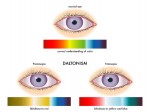This question plagues parents, activists, and anyone seeking to live a healthier or happier life than what they experienced growing up. Despite your best efforts to evolve, it is likely that at some point you have heard your mother or fathers words come out of your mouth. You may even have noticed that you picked up some of their idiosyncratic behaviors, or have some of the same health challenges. But are we doomed to live out the patterns and paths of the people who raised us?
Nature
First, lets consider genetics. We inherit more than just hair color and a funky nose shape from our parents. Many of our personality traits are passed through genetic coding. Our parents were the products of eons of evolution, full of information that passed through them to us. There are some things, like our preference for the color blue or that annoying nasal quality in our voices when we get upset, that might be inescapable.
We also inherit our parents predisposition to certain diseases. This doesnt mean we will automatically get that disease, but there is a possibility that if our birth parents had a genetic disease like diabetes or alcoholism, then we could, too.
We can do a lot with diet, exercise, and lifestyle choices. But if your parents or grandparents have a particular medical condition, you will want to monitor that area of your health closely.
Nurture
Most scientists are still on the fence on this issue, but the general consensus is that children are more influenced by the environment in which they are raised then their genetic inheritance. This means that your parents habits will have rubbed off on you more than the genetic information they passed down.
We pick up behaviors and cues for interacting with our environment (and much more) through what are called mirror neurons. Mirror neurons are what allow a child to learn to play an instrument by watching her teacher, and how kids teach each other hopscotch. They are also responsible for that unfortunate propensity to pick our noses when we think no one is looking, just like we saw Dad do.
The nurture theory also applies to our school, day care, friends, and all environments we spent time in as children. Some scientists believe that we are as influenced by our experiences in other social situations and learning environments as by the home environment. So your current quirkiness might be because of your teachers, friends, or batty Aunt Myrtle.
The good news is that any learned behavior can usually be shifted, if we bring conscious awareness to it. The challenge is learning how to shift the behaviors that are not serving us (or just annoy us), and being able to follow through on the work required to make the shift.
Aging
Another factor to consider is how we change as we age. Sometimes the behavior we see in our parents that distresses us, like giving up on a dream or listening to boring music, has more to do with getting older than with their personalities.
As we age, hormones that made us more vital and active like testosterone start to fade. This increases the possibility that we will gain weight and accept less-than-ideal life situations. Our brain chemistry shifts so that the motivation and planning areas are more active, but the reward and satisfaction areas are less active. This means we are more likely to want to plant a vegetable garden than jump out of a plane.
Many of the things we see in our parents that we vow to never become might just be a natural consequence of aging. Of course, we can stay vital longer by exercising frequently, eating well, and following our passions.
Choice
We end up like our parents to the degree that we move through life unconsciously. The answer, once again, seems to be mindfulness. The more awareness you can bring to your thoughts, actions, and patterns, the more free you are of habits. This is true whether the habits are inherited or learned.
If you see patterns and beliefs in your parents that you do not want to emulate, you can exercise your power of choice. But just like it is hard to get a tire out of a groove when your automobile is stuck in a ditch, so too can it be challenging to break free from an ingrained habit. You must be committed to creating healthier patterns that are more authentic to what you want to do and be in the world.
So, are we doomed to be like our parents? Yes and no. There are certain genetic proclivities we cannot change about ourselves. Some things are set into motion by the aging process. But with mindful awareness and commitment, it is possible to create a future based on our healthy choices.














